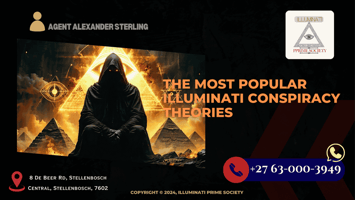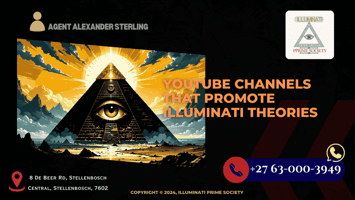Unveiling the mysteries that have captivated the minds of millions, this blog explores the most...
Illuminati And Pop Culture: A Digital Age Phenomenon
In the era of viral content and social media, the enigmatic world of the Illuminati has infiltrated the fabric of pop culture, becoming a digital age phenomenon that captivates millions.
To guide you deeper into the Illuminati ecosystem, talk to us:
-
“Ready to share your success story?” → Contact Form
-
“Learn directly from Agent Alexander Sterling” → Agent’s Blog
-
“Speak privately about your path” → Talk to Agent on WhatsApp ✅
- “Explore more member journeys” → /illuminati-member-testimonials
- "Illuminati in Modern Culture" → /illuminati-modern-culture
The Rise of Illuminati Theories in the Digital Age
The digital age has brought about a significant rise in the proliferation of Illuminati theories. With the advent of the internet and social media platforms, information and misinformation spread at unprecedented rates. This phenomenon has led to an increased fascination with secret societies, particularly the Illuminati, which is often depicted as a shadowy organization with immense control over global events.
Theories about the Illuminati have become a staple in online forums, YouTube videos, and social media discussions. These theories often link the Illuminati to historical events, political movements, and even natural disasters, creating a tapestry of conspiracy that captures the imaginations of millions. This digital resurgence has transformed the Illuminati from a historical footnote into a pervasive element of contemporary pop culture.
Illuminati Symbolism in Music and Entertainment
Illuminati symbolism has permeated various facets of music and entertainment, becoming a recurring theme in popular culture. Symbols such as the all-seeing eye, pyramids, and pentagrams are frequently cited as evidence of Illuminati influence in the industry. These symbols often appear in music videos, album covers, and stage performances, leading fans and conspiracy theorists to speculate about the true meaning behind their usage.
High-profile artists and entertainers are often rumored to be members of the Illuminati, further fueling public interest. Whether these symbols are used intentionally to evoke mystery or simply as a marketing strategy, their presence in mainstream media continuously sparks debates and discussions about the extent of the Illuminati's influence on popular culture.
Social Media's Role in Spreading Illuminati Culture
Social media platforms play a pivotal role in the dissemination of Illuminati culture. Platforms like Twitter, Instagram, and TikTok allow users to share and amplify content related to the Illuminati, creating a viral effect that reaches a global audience. Hashtags, memes, and viral videos contribute to the rapid spread of Illuminati-related content, making it a common topic in online discourse.
Influencers and content creators often capitalize on the intrigue surrounding the Illuminati by producing content that explores or exploits these themes. This not only boosts their engagement and follower count but also perpetuates the fascination with the Illuminati. As a result, social media has become a powerful tool in making Illuminati culture an integral part of the digital age experience.
Celebrities and the Alleged Illuminati Connection
Celebrities are frequently at the center of Illuminati conspiracy theories. High-profile figures in music, film, and sports are often rumored to be members of the Illuminati, with their success attributed to the alleged influence and backing of this secret society. These theories suggest that celebrities gain their status and wealth through their association with the Illuminati, which purportedly grants them power in exchange for their allegiance.
To guide you deeper into the Illuminati ecosystem, talk to us:
-
“Ready to share your success story?” → Contact Form
-
“Learn directly from Agent Alexander Sterling” → Agent’s Blog
-
“Speak privately about your path” → Talk to Agent on WhatsApp ✅
- “Explore more member journeys” → /illuminati-member-testimonials
- "Illuminati in Modern Culture" → /illuminati-modern-culture
Names like Beyoncé, Jay-Z, and Kanye West are commonly mentioned in these discussions, with their public personas and artistic choices scrutinized for signs of Illuminati affiliation. While these connections are largely speculative and unfounded, they add an element of intrigue and mystique to the lives of these celebrities, further entrenching the Illuminati narrative in popular culture.
Debunking Myths: The Truth Behind the Illuminati
Despite the widespread fascination with the Illuminati, many of the theories surrounding this secret society are based on myths and misconceptions. The original Bavarian Illuminati was a short-lived secret society founded in the late 18th century with the aim of promoting Enlightenment ideals. It was disbanded within a decade, and there is no concrete evidence to suggest that it continued to exist in any form resembling the modern-day conspiracy theories.
Most of the current narratives about the Illuminati are fictional and have been perpetuated by popular culture, literature, and media. While the idea of a powerful, clandestine organization controlling world events is compelling, it is important to distinguish between fact and fiction. By critically examining the evidence and understanding the historical context, we can debunk many of the myths that have turned the Illuminati into a digital age phenomenon.
.png?width=100&height=100&name=Illuminati%20Prime%20Society%20Logo%20(1).png)


